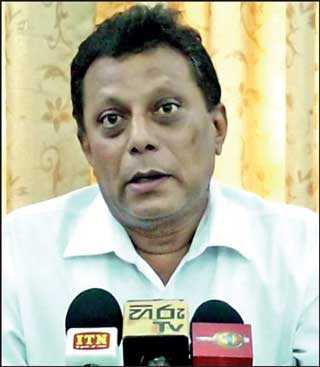Thursday Feb 19, 2026
Thursday Feb 19, 2026
Wednesday, 31 July 2019 00:00 - - {{hitsCtrl.values.hits}}
The Federation of University Teachers’ Associations (FUTA) yesterday said they were against the proposed Higher Education (Quality Assurance and Accreditation) Bill as it undermines the public university system, politicises its quality assurance and fails to resolve issues within the sector.
 |
FUTA President
|
Speaking to reporters FUTA President Prof. Rohan Fernando said that the proposed Bill had several issues. He pointed out that the Bill proposes to appoint a commission with sweeping powers to ensure quality and provide accreditation to State universities as well as private higher education institutions.
Currently the University Grants Commission (UGC) is entrusted with this role and taking accreditation away from the UGC would reduce its powers, he argued. In addition, the Commission consists of 13 members out of which nine members are appointed by the President from a pool of 15 members nominated by the Minster.
“Five out of these nine members work as full-time members of the Commission, and one of them chairs the Commission. By setting the quorum of meetings conducted by the Commission at five, the Bill allows these five full-time members who are political appointees to virtually run the Commission. It is the belief of the FUTA that this Commission run by political appointees will open the flood gates for the establishment of low quality private higher education institutions,” he said.
External quality assurances already being conducted within the State university system are problematic, FUTA members explained. They believe that without any assessment of existing quality assurance mechanisms, the Bill simply prescribes external quality assurance as the main tool to assure the quality of higher education institutions, including the quality of private higher education institutions.
“Quality of university education is assured not only by assessing quality externally, conducted by a few outside academics through site visits of short duration, but through the involvement of other forums in the university such as faculty boards, senates and other statutory committees. The current process relies heavily on the quantity of paper evidence which can be easily manipulated.”
FUTA argued that assurance of the quality of graduates of a higher education institute is as equally or even more important than assuring the quality of programs offered by higher education institutes. They are therefore unhappy about the external quality assurance process as proposed by the Bill and insist it will not be adequate enough to assure the quality of a graduate.
Private higher education institutions that operate on the principle of profit will seek ways to manipulate strict regulatory and accountability practices as they can be barriers to profit-making, FUTA said.
“The most serious measure that affects the State higher education adversely is the space allowed by the Bill for students to move between higher education institutions. This movement is allowed on the basis of the Sri Lanka Qualification Framework (SLQF).
“The FUTA is highly concerned about this space opened for ‘cross mobility’ in particular from the private higher education system to State universities, a movement between two vastly different systems – from the immature private higher education system which operates on a platform of profit-making to the mature State university system positioned on a platform of social justice. The Bill will leave space open for governments to force State universities to create multiple entry points in their degree programs so that students from private higher education institutions can easily enter State universities at different levels,” Prof. Fernando said.
The Bill, FUTA believes, will also mark the end of using G.C.E. (A/L) as the qualifying examination to recruit students to the State university sector. SLQF will ensure that qualifications by various institutes that are said to be equivalent to A/L’s could also be considered as entry qualifications to enter the state university sector.
SLQF, a quantitative measurement, which defines a minimum volume of learning as its primary measure of standardisation, is not a sufficient condition to facilitate “cross mobility” between drastically different higher education systems such as private higher education institutes and state universities, FUTA argues.
The Association therefore is against the Bill and want the Government to instead increase the funding allocations for the sector.
Pic by Sameera Wijesinghe